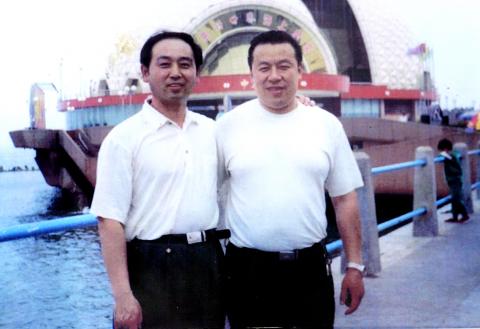Nine Chinese exiles in Taiwan — five dissidents and four Falong Gung practitioners — have been granted long-term residency permits after living in the nation for between five and 10 years without official status. They can become Taiwanese citizens after two years.
According to the Epoch Times and Radio Free Asia, the nine Chinese exiles had originally asked for political asylum and have been granted long-term residence permits by the government. The Mainland Affairs Council (MAC) confirmed the news yesterday.
The five Chinese dissidents are Cai Lujun (蔡陸軍), Chen Rongli (陳榮利), Wu Yalin (吳亞林), Yan Jun (顏軍) and Yan Peng (燕鵬).

Photo: Chien Jung-fong, Taipei Times
MAC official Chang Feng-ling (張鳳玲) said the nine exiles were granted the permits as a one-off special gesture.
MAC spokesperson Wu Mei-hung (吳美紅) did not respond to a Taipei Times phone call, but in an interview broadcast by Radio Free Asia, she said that this was a “one-off special project.”
“Each of these nine [Chinese exiles] has stayed in Taiwan for five to 10 years. So the MAC invited the relevant agencies to discuss the matter last year and decided [to grant them permanent residency] based on humanitarian considerations,” Wu said, adding that this was a one-off case that is not going to be repeated.
The granting of political asylum to Chinese in general would need amendments to existing laws and to be institutionalized, she said.
“Following the Ministry of the Interior’s proposed draft bill on refugees, the MAC has motioned for amendments to the Act Governing Relations Between the People of the Taiwan Area and the Mainland Area (臺灣地區與大陸地區人民關係條例). Both were handed to the legislature for further deliberation in 2012,” she said.
Taiwan Association for Human Rights secretary-general Tsai Chi-hsun (蔡季勳) said that not only had the nine Chinese exiles had to report to the police on a regular basis, they had also been deprived for years of various basic rights such as the right to work and to enroll in the National Health Insurance program.
Underscoring that Taiwan has ratified the two international covenants on human rights and has been reminded in a review report last year that it should offer protection to asylum seekers, the association in a public statement called for the immediate passage of the refugee act to ensure that any future asylum seekers’ human rights would be protected.
Winifred Tung (童文薰), a lawyer and Falun Gong practitioner in Taiwan, said a confidentiality agreement was signed between the government and the exiles.
“This is why you do not see the names of the four Falung Gong practitioners in the news,” she said.
“I’m pleased to have the residence permit now. One more month to go and I will have been in Taiwan for 10 years,” said Yan Peng (燕鵬), a well-known dissident from Shandong Province who fled from China in 2004 after being sentenced to prison for participating in the democracy movement. “I also hope that [refugees or asylum seekers] would be duly protected by an established refugee act in the future, since I can relate to them compassionately. I know the hardships and sufferings of not having [official status].”

Conflict with Taiwan could leave China with “massive economic disruption, catastrophic military losses, significant social unrest, and devastating sanctions,” a US think tank said in a report released on Monday. The German Marshall Fund released a report titled If China Attacks Taiwan: The Consequences for China of “Minor Conflict” and “Major War” Scenarios. The report details the “massive” economic, military, social and international costs to China in the event of a minor conflict or major war with Taiwan, estimating that the Chinese People’s Liberation Army (PLA) could sustain losses of more than half of its active-duty ground forces, including 100,000 troops. Understanding Chinese

The Ministry of Foreign Affairs (MOFA) yesterday said it is closely monitoring developments in Venezuela, and would continue to cooperate with democratic allies and work together for regional and global security, stability, and prosperity. The remarks came after the US on Saturday launched a series of airstrikes in Venezuela and kidnapped Venezuelan President Nicolas Maduro, who was later flown to New York along with his wife. The pair face US charges related to drug trafficking and alleged cooperation with gangs designated as terrorist organizations. Maduro has denied the allegations. The ministry said that it is closely monitoring the political and economic situation

UNRELENTING: China attempted cyberattacks on Taiwan’s critical infrastructure 2.63 million times per day last year, up from 1.23 million in 2023, the NSB said China’s cyberarmy has long engaged in cyberattacks against Taiwan’s critical infrastructure, employing diverse and evolving tactics, the National Security Bureau (NSB) said yesterday, adding that cyberattacks on critical energy infrastructure last year increased 10-fold compared with the previous year. The NSB yesterday released a report titled Analysis on China’s Cyber Threats to Taiwan’s Critical Infrastructure in 2025, outlining the number of cyberattacks, major tactics and hacker groups. Taiwan’s national intelligence community identified a large number of cybersecurity incidents last year, the bureau said in a statement. China’s cyberarmy last year launched an average of 2.63 million intrusion attempts per day targeting Taiwan’s critical

AGING: As of last month, people aged 65 or older accounted for 20.06 percent of the total population and the number of couples who got married fell by 18,685 from 2024 Taiwan has surpassed South Korea as the country least willing to have children, with an annual crude birthrate of 4.62 per 1,000 people, Ministry of the Interior data showed yesterday. The nation was previously ranked the second-lowest country in terms of total fertility rate, or the average number of children a woman has in her lifetime. However, South Korea’s fertility rate began to recover from 2023, with total fertility rate rising from 0.72 and estimated to reach 0.82 to 0.85 by last year, and the crude birthrate projected at 6.7 per 1,000 people. Japan’s crude birthrate was projected to fall below six,